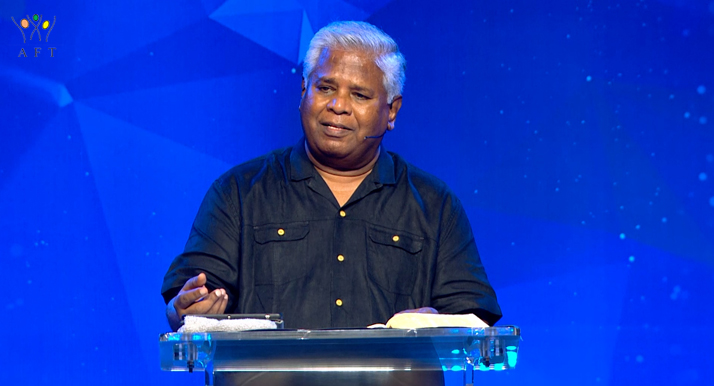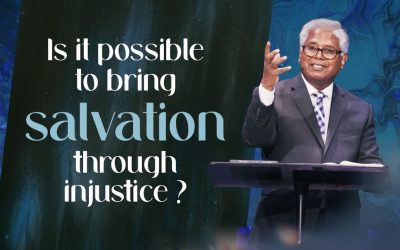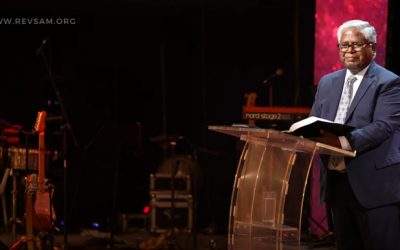
Abounding Grace (Vol. 44) – How Grace Changes Us?
Sunday English Service – 14 NOV 21
Transcript
Please turn with me to the Galatians, Paul’s epistle to the Galatians. Let me read to you from verse 16, all the way to verse 25. Paul’s epistle to the Galatians, chapter 5, verse 16, all the way to verse 25. I say then: Walk in the Spirit, and you shall not fulfill the lust of the flesh. For the flesh lusts against the Spirit, and the Spirit against the flesh; and these are contrary to one another, so that you do not do the things that you wish. But if you are led by the Spirit, you are not under the law.
Now the works of the flesh are evident, which are: adultery, fornication, uncleanness, lewdness, idolatry, sorcery, hatred, contentions, jealousies, outbursts of wrath, selfish ambitions, dissensions, heresies, envy, murders, drunkenness, revelries, and the like; of which I tell you beforehand, just as I also told you in time past, that those who practice such things will not inherit the kingdom of God.
But the fruit of the Spirit is love, joy, peace, longsuffering, kindness, goodness, faithfulness, gentleness, self-control. Against such there is no law. And those who are Christ’s have crucified the flesh with its passions and desires. If we live in the Spirit, let us also walk in the Spirit.
We’ve been dealing with grace from Romans, chapter 5, verse 20, where Paul says, “Where sin abounded, grace did much more abound”. What it is saying is, when sin came into the world, it abounded, that means it took over, it influenced everybody, it brought everybody under its control. Everybody was ruined, everybody was destroyed as a result of sin. Sin had such a huge impact upon the lives of people. But when the grace of the Lord Jesus Christ came through, what Jesus had done on the Cross, salvation, by grace through faith came. “When God’s grace came through Jesus Christ, grace abounded even much more”, Paul says. That means, whatever sin did, grace was able to undo, not only undo, but also really make everything beautiful and wonderful, like never before. So, we’re talking about this abounding grace.
Now, there is no better passage, I believe in the Bible than this, to teach about how grace abounds much more and brings about a change in a believer, deeply and permanently, in his life. To be a Christian means that you have resources for change, that are unique, and unsurpassed and unequalled. You have resources like no one else has. That’s the way the Bible puts it. What is the Christian? What is the mark of the Christian? What does the Christian have? The Christian possesses the power that raised Jesus from the dead. The power that raised Jesus from the dead is now in the Christian believer, changing him and transforming him. That’s the way the Bible puts it. It puts it in so many different places like that. For example, in Ephesians chapter 1, verse 18, because Paul is the man who has been changed by the grace of God. He was the persecutor of the church. He was hunting preachers and Christians, bringing them to the court, arresting them, killing them even, a violent man, violently against the church, the greatest persecutor of the church. But then, he was turned completely upside down, completely turned in his life. He became the greatest preacher of the Christian church. He went and preached Christ all over the world; the very Christ he hated, he began to love and was ready to even give his life for him. So, he understands how Grace changes people and that’s what we’re going to talk about today. How grace changes us.
And he talks about it in so many places. Let me just read you a couple of places. Ephesians chapter 1, in verse 18, he prays for the Ephesians. He says, “The eyes of your understanding being enlightened; that you may know what is the hope of His calling, what are the riches of the glory of His inheritance in the saints, and what is the exceeding greatness of His power toward us who believe, according to the working of His mighty power which He worked in Christ when He raised Him from the dead and seated Him at His right hand in the heavenly places.” In other words, he’s saying, “May God open the eyes of your understanding, so that you will see what kind of power has been applied in your salvation and what kind of power is now available to you. That power is the same power that raised Jesus from the dead. Let the believer have a comprehension of this power that is now resident in him and working in him”, he says. May the Lord open your eyes of understanding so that you know it.
And then, he goes on, in Philippians, chapter 3. Again, he talks about it. He talks about it in so many places because he’s so thoroughly familiar with it, that the grace of God changes people, radically, because he’s been changed, he has experienced it. He says, “That I may know Him and the power of His resurrection, and the fellowship of His sufferings, being conformed to His death”. He says, “I may know Him and the power of His resurrection”, he says. In Ephesians, he says, “I pray that God will open your eyes of understanding so that you will know that this power is at work in you. The word, “know” – if you’ve heard any kind of Christian preaching at all, in the past, the word “know”, you know, does not mean just an intellectual knowing, cognitive knowledge. No, it is not a cognitive knowledge, intellectual knowing. It is not like you read a book and you know something. It is talking about experiential knowing, knowing something by experience, by experiencing it. In other words, Paul is saying, “I pray that you will know it experientially, you will know the resurrection power, experientially”. He talks about it in Romans again, in chapter 6, and verse 4. Romans chapter 6, and verse 4, he says, “Therefore we were buried with Him through baptism into death, that just as Christ was raised from the dead by the glory of the Father, even so we also should walk in newness of life”. Again, he’s talking about “Christ was raised from the dead by the glory of the Father. In the same way we should be raised from spiritual deadness into spiritual life, so that we walk in newness of life”, he says. So, he’s very much interested in conveying this idea that believer is a person who possesses the resurrection power of Jesus that is at work in him, transforming him, changing him, and making him anew. So, you and I have a power to change us deeply, inwardly that nobody else has. It’s an amazing power. The power that raised Jesus from the dead, that broke the bands of death is in you, and is in me. Alright.
We’re going to look at how this power changes us, how it radically transforms us, how the grace of God comes and changes us completely. Now, before we do that, let’s look at the signs of spiritual deadness and signs spiritual life. Just like if a person is dead right now, physically, you can know that the person is dead through various signs that proves that the person is dead. And if he is alive, you know that he is alive. So, the Bible talks about spiritual deadness and spiritual life. The subject we’re going to talk about is how to go from the spiritual death to spiritual life. But let’s first talk about the state of spiritual deadness and what are the signs of it?
Go back to Galatians chapter 5, that passage that we read. Let me read to you, in that passage, the portion which tells us about the signs of spiritual deadness. When a person is spiritually dead, this is how he is. Verse 19: Now the works of the flesh are evident, which are: adultery, fornication, uncleanness, lewdness, idolatry, sorcery, hatred, contentions, jealousies, outbursts of wrath, selfish ambitions, dissensions, heresies, envy, murders, drunkenness, revelries, and the like… What a list; so many things. Now, you can, kind of, classify them into two categories, just for understanding. It’s a big list and you can categorize them in two ways. One: certain items in this list, you will find is more prevalent among people that have never experienced salvation, that have never come to Christ. They’ve never known salvation. People who are unsaved, the unbelievers; you will see it in them. Let me read to you those items that are more prevalent among them: adultery, fornication, uncleanness, lewdness, idolatry, sorcery, murders, drunkenness, revelries. These are things that are found among people that are pagan, people that don’t have anything to do with God, don’t have the knowledge of God and live without God. But interestingly, the rest of the list, the other items in this list, you have several things mentioned here that you will find among believers. They are saved, many times, they are in the churches in this world today. They’re “Christians”, so to speak. But you will find that they are doing these things, that you will find these things very prevalent among them. Sometimes there is an overlap, you know, some of those things that we classified under unbelievers, you’ll find among believers also. I’m not saying it’s a clear-cut classification but generally so.
So, here is the balance, the rest of the items, which you will find among the believers. They’re believers, maybe they’re truly converted and so on but they have not gone through this transformation. They do not know how the grace of God can change them. They have not experientially clearly seen the power of God work in their lives and change them and turn them around. So, they’re saved, baptized, have a membership and so on. But many times, some of these things are there in their lives. Let me mention some of those things and you will agree with me, I think, when I read that and say that this can be found in people that are so called “Christians”: hatred—verse 20—contentions, jealousies, outbursts of wrath, selfish ambitions, dissensions, heresies, envy. We all know that you will find many times these things among the so-called people that go to church and that claim to be Christians. You will find, still, these things. You will find hatred, you will find jealousies, you’ll find contentions, outbursts of wrath, selfish ambitions, dissensions, heresies, envy, and so on.
Now, let’s go to the other list – the signs of spiritual life. These are signs of spiritual deadness, that means that person really needs a change. That means that person really needs this power to work in him and transform him. He really needs a work of transformation in his life. Let’s go to the signs of spiritual life that is mentioned in verse 22 onwards. What are the signs of spiritual life? If a person has gone through some transformation, he must have some signs of a transformed life. What are the signs? Listen to this: But the fruit of the Spirit is love, joy, peace, longsuffering, kindness, goodness, faithfulness, gentleness, self-control. Against such there is no law. Let me quickly go through this list of nine items and explain what they are in just maybe one or two lines each, quickly, because we don’t have the time. But you need to be familiar with this. Love, first of all. Love. What is this? Love is opening yourself and serving somebody else for the intrinsic value of who they are, and not for what they do for you. You open yourself to a person, just because he’s another human being, for the intrinsic value of who they are not because of what they can do for you or what they potentially may mean to you tomorrow, but you just open your heart to them and serve them, simply because they are another human being. That is what love is.
The opposite of love if you ask people, they will immediately say, is hate. Love and hate. We think that these are opposites, but the Bible does not teach so. That’s why it’s important to look at what the Bible says. What is the opposite of love? It is not hate. Look at 1 John chapter 4, verse 18, says: “There is no fear in love; but perfect love casts out fear”. So, the Bible puts fear as the opposite of love. Why? What does this mean? Why does the Bible say the opposite of love is fear? When a person loves another person, he opens himself or herself to the other person and serves that person, not for what they do, but for their intrinsic value, just because of what they are, just because they are a human being. Now, when you open yourself to another person, you can be attacked in so many ways. It’s like opening your house to somebody; somebody can steal everything and go away. Somebody can cause a lot of damage. So, when you open your heart to somebody, you become vulnerable. Love means vulnerability. When you love a person, it’s possible that you would probably get hurt along the road somewhere. That person will disappoint you, that person will reject you, that person will disappoint you. So, love opens a person to vulnerability of that kind.
So, a lot of people don’t love because of fear. Fear stands there. When there is fear, there is no love. When there is love, there is no fear. So, when a person loves, that person cannot love without dismissing fear. That’s why in 1 John 4:18, we read: Perfect love casts out fear. It’s a very strong expression. “Casts out fear”, means it just throws it away. It gets rid of fear. If you enter into a relationship of love, of any kind, in marriage, and whatever it is, friendship, whatever. If you enter into a relationship, where you love a person, that means you have abandoned fear. True love means that you don’t fear anymore. You open yourself to that person and you love that person and interact with that person. If you’re afraid, then you cannot love anymore. If love is there, fear cannot be there. If fear is there, love cannot be there. It’s a very important thing about love.
Look at joy! The next item is joy. What is joy? Whereas love is opening yourself to someone for the intrinsic value of who they are. Joy is delight in God for the intrinsic value of who He is. Love works horizontally; joy works vertically between you and God. Joy is where you delight in God for the intrinsic value of who God is. That means you’re not delighting in God because of what He can do for you. There’s no ulterior motive there. Even though God does a lot of good to us, there’s a lot of good things that come to us from God. There are many good gifts that God gives, but that’s only secondary. Our joy in the Lord is not because of all that He does for us. It is because of who He is. He’s God! He’s God; He’s the creator God; He’s our everything. There is none else; He is God. We joy over Him, in that way. We’re not having joy over Him because of what He does for us. We joy over Him because of what He is. He is God.
Peace is the next item. What is peace? Peace is trust and confidence in God’s wisdom, and control over your life. You have peace when you understand that you are not wiser than God, that God is wiser than you. And since God is wiser than you, that you trust Him, and you have confidence in Him, you give Him the control of your life. You’re saying, “Lord, I’ll do what You want me to do. Let Your will be done in my life. You be the Lord of my life, You govern my life, You control, You do, You lead me and You guide me”. Because you are convinced of His wisdom, you know that He is wiser than you and that is what brings peace. When we think we are wiser than God, and when we reserve the right over our lives for ourselves, and when we say, “No, we will govern ourselves; we don’t want God interfering in this. When He comes in, He may take us in the wrong direction, He may do the wrong thing. He may demand things from us that we don’t like. So, let’s run our lives”, we think. And that is what results in lack of peace, losing peace. When you give it in the hands of God, He’s far wiser than us and you trust Him and you have confidence in Him and give Him the control of your life, that’s what results in peace.
The next is kindness. What is kindness? Kindness is actually generosity, as opposed to envy. Generosity of spirit, the opposite of that is envy. This person has a generous spirit. What is a generous spirit? This person is able to delight, is able to delight when he sees other people doing well. He’s delighted to see people coming up, he’s delighted to see people succeeding in what they do. Not everybody is like that. Some people have a very petty mind. They cannot rejoice over anybody else’s well-being. That is not kindness. Kindness is a generous spirit, where you truly rejoice over the other person’s well-being, that he got a good job or you know, something is going well for him in his life. He’s coming up, that causes you to be happy. That is what kindness is all about. It’s a generous spirit. Instead of envy, there is kindness. The opposite is envy.
The next is goodness. What is goodness? Goodness really means sincerity or integrity or honesty, as opposed to hypocrisy. That’s what goodness is all about. And integrity or honesty comes from having enough of love, enough of joy, enough of peace, and enough of everything else that is listed here. So, when a person has these qualities, when a person is truly transformed, and the Holy Spirit has done a work in him, he’s been changed. See, sin ruins everybody and as a result, people become like the person listed in Galatians chapter 5, from verse 19, onwards: adultery, fornication, uncleanness, lewdness, idolatry, sorcery, hatred, contention, jealousy, outbursts of wrath, selfish ambitions, dissensions, heresies, envy, murders, drunkenness, revelries. That’s the life of the person who’s been ruined by sin, destroyed by sin. Sin has come in and literally taken over his life, is ruling over his life, is taking him into all these things, he’s living like that. But when a person comes to Christ, when the transforming power, the resurrection power of Jesus works in a person’s life, that person becomes a person who you will call as a good person. There is goodness that is there in him. When you say there is goodness there, you mean that there is love there, there is joy there, there is peace there, there is patience there, there is every good quality that is mentioned here. What does that mean? That means that person is same with one group of people as he is with another group of people. He is the same in public as in private, he’s the same on Sunday and Monday. He is the same in darkness and in light. He’s the same when he’s around people or when he’s alone. It doesn’t make a difference because that’s become his character. That’s the way he is; he’s good.
The next is faithfulness. What is faithfulness? Faithfulness is actually dependability. Being absolutely wholehearted as opposed to being half-hearted and a lackadaisical person; being a reliable, dependable person, absolutely there, utterly committed to whatever is given for him to do. He gives his whole heart and mind and soul into it and applies himself to finishing whatever he set out to do, whatever responsibility is given to him. That’s faithfulness. An unfaithful person is a person to whom you give responsibilities and he will say, and promise big time, saying that he’ll do this, he’ll do that but never does that. He never fulfills his promises, always leaves things undone, and does not do them completely and comprehensively. Alright
Next is gentleness. Gentleness is a poor translation. “The word must be humility”, they say. What is humility? Humility is not like some people think, you know, when people go around, say, “I’m nothing; I’m nothing”, you know. They put themselves down; they think that is humility. I think a lot of understanding about humility is like this, on a very simplistic level. They think we must be humble, so we must say, “I’m nothing; I’m nothing”. But that is not humility. What is humility? It is not about putting yourself down. It is not thinking of yourself as less. It is about not thinking about yourself at all. That is what humility is. A person that has humility is not self-conscious. He’s not upset at little words spoken by people that don’t have humility. You’ve got to watch out because you’ll be talking about something else unrelated and they’ll take offense because they say, you know, “You said that and it hurt me”. And you never meant to hurt them. You were talking about something else but it’s hurting them, you know, because they never think about anything else, or anybody else. Their total attention, even when there is 100 people there, their attention is on themselves. What does everybody think about me? What is everybody saying about me? What is everybody looking at me as, you know? That kind of thing.
And then finally, self-control. Self-control is the ability to always choose the important thing over the urgent thing. The person with self-control, doesn’t do things hurriedly or urgently, in a moment of hurry, just because he’s got to do it. He will say, “I had to do it”, that kind of thing. A self-controlled person is a person who’s able to choose the important thing over the urgent thing. Alright.
It’s just to give an idea of what these qualities are because that’s what a Christian is. That’s the way the Bible— this is the way, originally, God designed man to be. And in salvation, this is where God is taking man. Taking us from sin, saving us, rescuing us, bringing us out of the kingdom of darkness, into God’s Kingdom, working on us by His resurrection power in us, transforming us, taking as where? Taking us to be like this, this kind of people. People that are described here, as ones who have love, joy, peace, longsuffering, kindness, goodness, faithfulness, gentleness, and self-control. Alright.
Now, how does one go from a spiritually dead state, from a sinful state, from that evil list that we just read, from that kind of a person to a person who has spiritual life? A person who has joy, peace, and righteousness and so on, that type of love, joy, peace, and all of these things? How do you go from the darkness to light? How do you go from death to life? How does that happen? How does it work?
Now, we can lay out the principles, we can start laying out the principles; I won’t be able to finish all of it today, but I’m going to continue next week also. But let’s do it. It’s a very interesting principle. This passage is probably the best passage with regard to this. How does God change people? How does the grace of God work in a person’s life? How does it change a person? This is the best passage to study. There are many surprises here, many astonishing details here, really. Maybe you’ve never seen them. Let’s look at that.
The first thing is, look at verse 16, what it says, the statement there. Paul says, “I say then: Walk in the Spirit, and you shall not fulfill the lust of the flesh.” Walk in the Spirit, and you shall not fulfill the lusts of the flesh. Now, you would think that he would say, “Walk in the Spirit, and do not fulfill the lusts of the flesh.” That seems like a logical way of saying it. Walk in the Spirit, don’t walk in the flesh; walk in the Spirit, don’t walk in the lusts of the flesh. That seems to be the way to say it but he doesn’t say it like that. He puts it in a particular way. I’m not saying that he doesn’t say, don’t do this, don’t do that, and so on. There are other places where he talks about, don’t lie, don’t steal, don’t, you know, don’t do certain things. He clearly says those things and they have to be said. But here, he puts it in a particular way. I want you to notice that here. Here he says, “Live by the Spirit and do not gratify the desires of the sinful nature.” Why doesn’t he say, here, he says, “Live by the Spirit, and you will not gratify the desires of the sinful nature.” That’s the way he puts it. Why doesn’t he say, “Live by the Spirit and do not gratify the desires of the sinful flesh?” What’s the difference? Now, you may say that’s a minor difference. Well, there is a real difference, I think. Here, he’s indicating something here, a very important truth here. What he’s saying is, he’s not saying, “Live by the Spirit and don’t gratify the desires of the flesh.” That’s not what he’s saying; that, everybody says. But what he’s saying is, “Live by the Spirit and you will not gratify…” No, “do not”. “Will not gratify the desires of the flesh”, or sinful nature. What does he mean? He means that if you live by the Spirit, if you understand what it means to live by the Spirit, then the result of such a living will be that you will not gratify the sinful desires are lusts of the flesh. In other words, he says, “If you live like that, that will be the result. You will live like this; this will result in that”. He is talking about a process. He wants you to notice how you move from here to there, how have you move from being this kind of a person but that kind of a person? You don’t move from here to there by saying, “I live by the Spirit; I won’t do it, I won’t do those things”. No, that’s not how you move from this to that. A lot of people are more trying to move from here to there by that kind of a formula. I live by the Spirit; I will not do the things of the flesh. No, no, that’s not how you go. He says, “You live by the Spirit and it will result in you not gratifying the sinful desires”. “Live living by the Spirit will result, will produce, that kind of an outcome”, he says. There is something really here. What he’s saying is this. He says, “If you live by the Spirit, what it will do is, it will weaken the sinful nature. It will weaken the sinful inclinations. It will weaken your lustful desires. It will weaken your lusts of the flesh. As you live by the Spirit, you will find this side weakening”, he says. You want to weaken the lust of the flesh. You want to really bring it to a level where it doesn’t affect you anymore and it doesn’t overcome you anymore. It doesn’t make you go into those things anymore. You want to bring it to a place where you overcome it and you live above it. “You live by the Spirit”, he says, “Then you will weaken the other side. You will weaken the lusts of the flesh”. That’s what he’s trying to tell you to notice.
So, he’s talking about a spiritual discipline, that it’s deeper than just trying harder. If he said, “Live by the Spirit, and don’t do or don’t gratify the desires of the flesh”, then that will be like saying, “Try harder; don’t do it”. Try not to do those things that you’ve been doing. Which is what a lot of Christians do. That’s the way a lot of Christians understand it. But he is not doing that. He says, “Live by the Spirit and you will not gratify the lust of the flesh”. That means, if you live by the Spirit, the lusts of the flesh will be weakened, day by day, and you will live a victorious life. That’s the first thing; that’s the first principle.
The second thing we learn here is, if you want deep change, if you want deep change and real change in your life, he says you need to bring all your resources that you have available to you. What are the resources that are available to you? You have the resurrection power of Jesus Christ dwelling in you, residing in you. That’s the whole point he makes. So, you have those best resources, the resources that nobody else has, you have it, you have the resurrection power of Jesus, you bring those resources and apply them to the main problem. The thing that is bothering you, the desire, the lusts of the flesh, that is time and again defeating you, that is time and again, causing you to live the way that you used to live as a person without Christ. The thing that is a problem, that is a challenge. “Bring this and apply it here”, he says. Live by the Spirit and you will not gratify— Gratify what? Gratify the lusts of the flesh.
Now, notice something here. Now, the lusts of the flesh is the way that he puts it here, in verse 16. All the English translations translate it like that. It comes from a Greek word, ‘epithumia’. That word is used widely from by Paul, Peter, John, James, everybody uses it. They all talk about the lusts of the flesh. And it comes from that one Greek word, ‘epithumia’. They all translate it as lust of the flesh in English. But the thing is, there’s a problem with the translation. It’s a very poor translation, because as soon as you mention lust, you are inclined to think only about sexual sins. So, you, kind of, limit the scope of that thing and take it in that direction. Lust means immediately you focus on sexual sins, which is wrong, because lust covers much more than just sexual sins. Therefore, using the word, ‘lusts of the flesh’, actually misdirects us, takes us somewhere else where it’s not intended. Paul did not intend it to just concentrate on sexual sins. He’s meaning something much larger than that, when he says, “Lusts of the flesh”. So, the modern translations use the word, ‘desire’. Desires of the flesh. Now, desire is a good word but it’s a weak word. Lust is a strong word but it misdirects you. It takes you to the wrong place, makes you think of something else. But desire is a weak word. It just takes away all the juice out of it, you know, it’s like it’s nothing, no issue at all. It’s just desire, not lust, just desire.
So, great Bible scholars have suggested over a long period of time, many alternative ways to translate it. The best alternative they’ve suggested is this. And a lot of people agree with this, that that word ‘epithumia’, which is translated a ‘lust of the flesh’, must be rightly translated, not as desire or lust of the flesh. It must be translated as over desire, super desire, and overwhelming desire. Over desire, super desire, or overwhelming desire.
Now, the problem with this is a lot of Christians think that when the Bible talks about the lust of the flesh, there’s overwhelming desire, super desire, are over desire. It is referring to sinful things, they think. It’s referring to the wrong things, desiring the wrong things. We think like that but it’s not just referring to the wrong things. Last week I shared a little bit about how you can go wrong by wanting the right thing too much, you know. So, Paul really means that it’s not just wrong things that the lustful desires are about. It can be good things, right things, but you set your heart in them in a disproportionate manner. You should not have put it like that. It should not have become such an important thing to you. In other words, you made an idol out of it. It’s bigger than God to you. It’s the thing that’s the most important thing in your life. You made it like that, that itself then becomes a problem, becomes an issue.
Let me give you an example. I thought about much, but a good example. No example that I have read anywhere, satisfied me but I picked an example from our society itself. Take for example, exams – school and college exams. All the young people listen. School and college exams. Exams are good; they’re meant to do something good. They are meant to check whether you have absorbed what has been taught. Whether you know what you learned; whether you learned anything. Your parents pay fees, and send you to school, did you learn anything? They give an exam, get the marks and send it to the parents in the report card saying, “Yeah, you paid us and we taught him. Here’s what he’s got. This is what he’s got”. So, exam is a good thing; nobody thinks exam isn’t, except the students. I remember, I used to think the teachers are my biggest enemies. They’re trying to kill me by asking very difficult questions and failing me. I used to think all kinds of things. But I understand now. No, no. no, they are the greatest gifts to society, They are good people. They’re doing a very good service. So, exams are good things; education is a good thing. We must desire education. We must go after education. We must seek education. We must seek to be educated. I believe in that with all my heart.
But, you know, sometimes this good thing is turned into a bad thing. Instead of seeking it in a very healthy way and getting our children into that and getting them educated well, and getting them to do well, sometimes, it looks like the wrong things happen. In certain sections of society, the family ends up putting such a great pressure on the child. So, the child is told, look, exam is coming. I don’t know what you will do. You’ve got to get this kind of marks. And you got to pass this test. You have to pass this entrance exam. You’ve got to get that seat in the engineering college, or medical college, or whatever college it is. You’ve got to get into that institution, this institution. If you don’t do that, then I cannot show my face outside. I cannot answer any phone call. All our relatives will be calling as soon as the result comes. They’ll all want to know what you got. I cannot answer them. I cannot show my face outside. I cannot lift up my head and shoulders and walk out in the street. I’ll be put to shame. Our life ends here. This is the end of our life. No wonder kids kill themselves, under that pressure. Education then becomes a cursed thing for them.
Now, children killing herself or himself is one thing, you know. That’s a very sad thing. Because of pressure. But I’ve seen more students hate education, detest education, get away from education, don’t want to go anywhere near books because of the way education has been thrust upon them, pushed down their throats. They don’t want to have anything to do with it. They have a hatred towards education. They don’t want to study. They want to do anything else but education. What has happened? It’s a good thing but it’s been turned into a bad thing. Since you told them, you’ve got to get this many marks, this many things, you’ve got to get into the entrance exam and make it, got to get into that particular college and so on. Since you made it their condition, so that they will have a life and otherwise there’s no life. Since you put it like that, that’s the problem. That’s exactly what Paul is dealing with here. Paul’s dealing with Galatians is about law and grace. Paul has brought these people to Christ and has told them, “You put your faith in Christ, you’re saved. Then, as a result of being saved, you do what the law says. The law is good. You will be given the power to do what the law says also, but you put your faith in Jesus, you’re saved. Then as a result, you’ll do what the law says”. Some other fellows came and taught wrongly. They said, “You put your faith in Jesus. Then you observe all the law meticulously, impeccably, cleanly, without even one mistake and then only, you will be saved. Then only, will you go to heaven. Then only, God will hear your prayer. Then only, you have a life. Then only, you have a future. Then only, your prayers will be heard. Then only, you will have the favour of God”.
Do you know what a big difference this is? The believer becomes just like that child who’s facing an exam now. He’s got to do it. If he doesn’t do it, he doesn’t have a life. If he doesn’t do it, he’s doomed. He’s going straight to hell. He’s got to meticulously observe the law. He’s got to be impeccable with that. He cannot fail in any area. He’s got to be perfect. If he’s not perfect, he’s not going anywhere. God is not going to bless him. Just think what kind of pressure the person will have. People that grow up in a legalistic setting, where legalism is taught, in the name of Christian teaching, end up like that. They’re under pressure. They’ll come to church, they’ll be standing like this, and everybody’s happily singing. They’re all tensed up. When you say, “Open the Bible; let’s read this passage”. They say, “What’s the use of opening the Bible because it doesn’t work for me? I’ve failed”.
Like, there was one guy, many years ago, when I first started out. A lot of young people started coming. I used to have youth meetings and I was also a youth at that time. Believe me, when I used to have youth, this place would be filled with people, youth, a couple of 1000 youth, gathering here. We would have youth rallies, all day meetings, very successful it was. A lot of young people turned to Christ. Among them, there was this young guy. He used to smoke and drink and do these things. I’m not a preacher, where this week I preach about smoking, next week about drinking and that kind of stuff, you know. I don’t even go into that. But this is a church where a lot of people have come, druggies have come, not even able to open their eyes, you know. Like this, they’ll come. Today, they’re preachers. Many of them like that. Drunkards have come; they’ve completely stopped drinking. Even this morning, I saw one man in our service, Tamil service, he came here because all of a sudden, his wife was missing. And he is not from our church. His wife was missing. And because his wife is a very spiritual lady. She’ll go to all kinds of meetings and so on. So, he started looking for her at all the churches. All these little churches that are run in homes, you know, he started going one after the other, looking. He is not a church guy, you know. He’s a Christian guy, but he doesn’t like church, you know. He just goes to church [Tamil] you know. He doesn’t like really, particularly, spiritual life and all that. So, he went everywhere, looking for his wife for two, three days. He couldn’t find her. Finally, somehow, he ended up here. He didn’t even know there was a church here. Someone showed him. He asked where and came over here and met somebody here and asked them and they prayed for him and they said, “No, we don’t know anybody like that. Nobody came here”. Then he looked at this place and asked what’s happening here, services? He came that Sunday to the service. And then, in the meanwhile, he found his wife and a little church somewhere near his house. She’s sitting there, in the pastor’s house. He went and got her back He was angry with her or something. She just took off. And then went and got her and then, they all came to church. The whole entire family came to church.
He said for several months, he used to come and attend. On the way home, he will stop and get a bottle of whiskey and go home and fully get drunk and eat. That’s how his lunch goes and evening goes. He’ll come to church, on the way, he’ll stop in liquor shop and get his bottle and go home. With the Bibles, they’ll come to church. On the way home, he stops at the brandy shop and gets something to drink and goes home and this is the way he lived, he says. But as he kept hearing the Word of God, something happened to him. The Spirit of God, the One who raised Jesus from the dead, comes into that person, you see? He gets to deal with that person. He gets to transform even a Saul, a man like Paul, a hard-hearted man like Paul, so, God got into him and he says that at a certain point he completely gave up drinking, completely took after the Bible. He’s a businessman, got into the Bible. He’s now going around, preaching everywhere also, wherever they call him. He comes to church here. Like this, there’s a lot of people here.
So, this guy, young guy was here. He was very close to me at the time. And he told me one day, he said, “Pastor, I gave up drinking, I gave up smoking, I gave up all those things. You never told me anything but I gave up all those things. I was living well for God. But recently, you know, something happened that has really derailed me completely. I went to a party and these guys gave me a little bit to drink and somebody gave me a cigarette and I smoked and I drank a glass of something. And immediately the thought came to me. See, I’ve smoked one cigarette so what is the difference between one and 100? So, I started buying packets and packets. I had one gulp of a drink. So, let me just go at it, you know. So, I started buying bottles and drinking. My interest in God is gone, my Bible reading is gone, prayer is gone, everything is gone. Because my logic is working like this. Anyway, I’m not going to make it if Jesus comes now. I’m not going to go; He’s going to leave me behind. I’m not going to go to heaven. He’s not going to answer my prayer. He doesn’t favour me; He doesn’t show me any kind of favour at all. My prayers will not even reach the roof of this church. So, what is the use of praying? So, I stopped praying. What is the use of reading the Bible?” This is the way his life went. What I’m saying is, he came from a background where he was oriented that way – legalistic orientation. That’s the background he came from. A very legalistic background he came from before he came here. He’s been told that if you’re not perfect, that’s it, you’re rejected by God. God has nothing to do with you; God wants only perfect people.
Now, I’ve been in that kind of background also. So, when communion is being served, like today, I have even, sometimes, shuddered to touch it because I thought I’d fall dead, you know. Because I’d done something wrong, I’m going to fall dead, man because, you know, I’m a sinner. How can I have this? So, I will run off with others. A whole bunch of us will just rush outside, and always will just stand outside. No, no, we don’t want to have nothing to do with it. You guys have communion and we’ll be looking inside at the people that are inside. And I’m standing there, wondering why that person is taking communion. Is he going to fall dead because I know who he is? I’m standing there judging everybody. And we’ll be talking, “Look at that guy; he’s not a holy guy, he’s talking communion. Why are we standing here? What the problem?
What I’m saying is, this legalism, what it does is this: it really drags people into sinning. It drags people into sinning by condemning that person, just like it happened to this guy. He smoked one cigarette, drank one gulp of something and immediately, the law comes and condemns him and says he is useless. He is no good. God doesn’t want him and so on. So, he completely abandons himself into that kind of life. So, the law ends up taking him into sin. That is how the Apostle Paul talks about in Romans 7, as well as right here, he talks about it like that. He talks about what fuels that fire, what serves as the call for the fire of lustful desires, burning in the heart of a person. What is the wood that causes this fire of lustful desires to burn in that person? What is it that causes this over desire, super desire, overwhelming desire, to burn ever stronger, regarding certain things?
What is the wood for the fire? The wood for the fire is mentioned here, in verse 18. Look at verse 18, you’ll be shocked. That’s why I say, there is astonishing details here. You will be shocked with this if you understand this. Verse 18 says, But if you are led by the Spirit, you are not under the law. Now, you may think it’s nothing but let me explain it to you. Verse 16 says, Walk in the Spirit and you shall not fulfill the lust of the flesh. Right? We understood that. But here it says, if you’re led by the Spirit, that is, if you walk by the Spirit, you are not under the law. Now, if you put the two together, what this means is, if you are under the law, you will fulfill the lusts of the flesh. Paul puts ‘being under the law’ as the opposite of ‘walking by the Spirit’. He says, “If you walk in the Spirit, you will not fulfill the lust of the flesh”. But then, he says, “If you’re led by the Spirit, you’re not under the law”. That means, if you’re under the law, then you’ll be fulfilling the lust of the flesh. How? Because the law itself, by condemning you, will lead you into sin and keep you under sin.
The law’s job is to condemn you. Romans, chapter 7 says that also. The law ceases the occasion, it seems. In Romans 7, it says, “It ceases the occasion, tries to condemn you and bring you under sin”. So, the law itself becomes the fuel for the fire that’s burning already. The fire of overwhelming desire, the fire of over desire, that the wrong desire that’s burning, desire that is aimed at wrong things. The fire is burning and the fuel is added by the law, the condemnation of the law. Just think about that; compare 16 and 18. 18 says, “Walk in the Spirit, you will not fulfill the lust of the flesh”. That means walking in the Spirit and fulfilling the lust of the flesh are opposites. If you walk in the Spirit, you will not fulfill the lust of the flesh. Come to 18, it says, “If you’re led by the Spirit, you’re not under the law”. Being under the law is opposite of being led by Spirit. So, that means, being under the law and satisfying the desires of your flesh are together. If you’re under the law, you’ll be satisfying the desires of the flesh. In other words, Paul Says, “Don’t go into this law business. These guys are coming and teaching you law, they want you to get back into legalism. Don’t go back into that. Why? Because if you go back into this, your whole life will become a failure. You’ll go into sin; it’ll condemn you, take you back into sin. You’ll feel useless. You’ll feel hopeless. You’ll feel condemned. Just like your kid hates education because of the over desire on education. He ends up and coming away from education. The believer, because of the over desire on the law, the law is good. Paul is not teachings, saying, you know, you hate the law or you don’t do the law or anything like that. The matter here, in the Book of Galatians is not that you should not obey the law, Paul never teaches that. In fact, in verse 13, he says, “Brethren, you have been called to liberty. Not to be under the law but in liberty”. And then, he says, “Only do not use liberty as opportunity for the flesh, but through love serve one another”. And then, he says, “For all the law is fulfilled in one word, even in this: “You shall love your neighbour as yourself.”
Now, tell me, is he telling you to obey the law or disobey the law? See, some people take Galatians and they think it’s talking about whether you should obey the law, observe the law, or not observe the law. That’s not the issue here. The issue is not whether you should do what the law says or not. That is very clear. You should do what the law says. In fact, he gives you a very shortcut understanding of doing what the law says. “If you one thing, you’ll fulfill all the law”, he says. If you love, you’ll fulfill the law. That means, He wants you to fulfill the law. The law is the law of God; He wants you to fulfill the law. He’s not against the law. So, the issue is not whether you should do what the law says or not. You know what the issue is? Whether you should rely on the law. Should you rely on the law for your salvation? Should you rely on the law to guarantee answer for your prayer? Should you rely on the law to receive favour from God? Should you rely on the law for the blessings from God? Should you rely on the law for God to receive you, accept you? The answer is no. You should not rely on the law. You should fulfill the law. Follow the love command, you’ll fulfill all the law. Paul says so. So, fulfill the law in that way. That is a New Testament way of looking at it. But don’t rely on the law for your salvation, for receiving favour from God, for the blessing of God, for anything. Do not rely on the law. If you rely on the law, then you become like that little kid with the examination. You’ve got to do this, otherwise you’re doomed. You’ve got to do this otherwise you hang yourself and die. You’ve got to do this otherwise you have no future. That kind of situation.
Now, I have great sympathy for legalizers. Just imagine what kind of Christian life people will have, when they are oriented that way, when they’re taught that way. They’ll all be like that little kid. You’ve got to do or die. You be perfect or you’re gone. You better be perfect, otherwise God will never listen to your prayer, never answer you, never give you any favour. You’ll not be accepted at all. What a terrible thing it is. So, what do we do? I’m going to deal with it next week. Very interesting. What should we do? In verse 24, he says. Let me just start it and leave it there and we’ll continue next week. 24: And those who are Christ’s have crucified the flesh with its passions and desires. Those who are Christ’s have crucified the flesh with its passions and desires. So, if you’re Christ’s, you crucify the flesh with its passions and desires. What does it mean? “Crucify”, he says. He could have said, shoot it, kill it, cut it, cut it into pieces, kill it. But he uses the word, “crucify”. Crucify is the way that you put it out. Kill that thing – the desires of the flesh. Not any other way. Not stab it, not cut it into pieces, no decapitate it. There are so many ways to kill something. He doesn’t mention all of it. He says, “Crucify”. Only crucifixion works. Why does he use that? He uses that because he says what is the issue in your life? What is the thing that is looming there? What is the thing that has become bigger than anything in your life? You think, if I don’t have this, then I’m doomed. What is the thing that is bigger than God? That’s become your idol. You think without this, I’m nothing. You take that and bring it to the Cross. And look at the Cross and look at this. In the Cross, you have the Saviour, Jesus, hanging there shedding His blood, dying for you, loving you, giving His life to you.
For the kid that is facing the exam, she has been told or he has been told that if you don’t do this right, then you’re doomed. You have no future. You’re nothing. We can’t face the world. Such a child can bring that to the Cross and look at the Cross. When you look at the Cross, you’ll begin to learn immediately. When you meditate on the Cross, you being to learn immediately. He died for me. He loved me. He saved me. He was even willing to give His life for me. He accepts me. He did this for me. He loves me. Now, what does it matter whether my relatives around me love me or don’t love me? If it means that if I don’t score enough, they won’t love me, let them not love me. The only thing that matters to me is that my Jesus loves me. God Almighty loves me. He has given His life for me. If others don’t think of me very much because I’ve failed in this thing or I’ve not lived up to the marks that I should get and I’ve not gotten a seat in such and such a place. They think I have no future. But my master and my Lord, my Saviour says, I have a bright future in Him! I trust His wisdom! He can take me to the place that I need to go. He can give me what I must have. And He can guide me. I’ve given my life in His hands. I think my wisdom is not enough; I trust His wisdom. That is why he says, “Crucified”. Crucified – bring it to the Cross, put it there, when you look at the Cross and the One hanging there for you and loved you and gave everything for you. This thing will become like nothing. This is nothing. The thing that you think is so big, that’s going to give you the life and that’s going to mean everything to you, will mean nothing to you, in light of the Cross of Calvary.
Well, I’ve started that but I will continue it next week. It’s enough for one day, I think, to think about today. Think about it. If you have anything else that you consider as the biggest thing, that without that, there is no— You know, a lot of people have a lot of things, you know. Some people think, I’ve got to marry this guy or this girl, otherwise I have no future. Nothing. I’ve got to get this education, get this thing, otherwise there’s no future. I’ve got to go to this college, otherwise… All kinds of things they have, that’s become their idol and they forget the One who gave His life. And I’ll tell you, Christianity is about looking at, keeping your eyes on the One who gave His life for you, so that your priorities are right and you go in the right direction. You don’t allow these things to dominate you. You allow Him to guide you and lead you. Amen.
Next week, I’ll talk about how looking at Him, you’ll be changed, transformed. Let’s all stand together. Let’s pray.
How to live by faith during evil times? | Habakkuk 1:1-17 | Sam P. Chelladurai | 7-Jan-23
தீமைகள் நிறைந்த சூழ்நிலைகளில் விசுவாசத்தினால் வாழுவது எப்படி? | Sam P. Chelladurai | 7-Jan-24 | AFT
தீமைகள் நிறைந்த...
தேவன் பேசியிருக்கிறார்! நீங்கள் விசுவாசிக்கிறீர்களா?
தேவன் பேசியிருக்கிறார்!...
God has spoken! Do you believe it?
God has spoken! Do you...
ஆராதனையின் புதிய ஏற்பாட்டு அடிப்படைகள்
ஆராதனையின் புதிய ஏற்பாட்டு...
New Testament basics of Worship
New Testament basics of...
இயேசுவில் உள்ள தேவ மகிமையை ருசித்துப்பாருங்கள்! (பகுதி 2)
இயேசுவில் உள்ள தேவ மகிமையை...
Taste and see God’s glory in Jesus! (Part 2)
Taste and see God's glory in...
இயேசுவில் உள்ள தேவ மகிமையை ருசித்துப்பாருங்கள்!
இயேசுவில் உள்ள தேவ மகிமையை...
Taste and see God’s glory in Jesus!
Taste and see God's glory in...
















